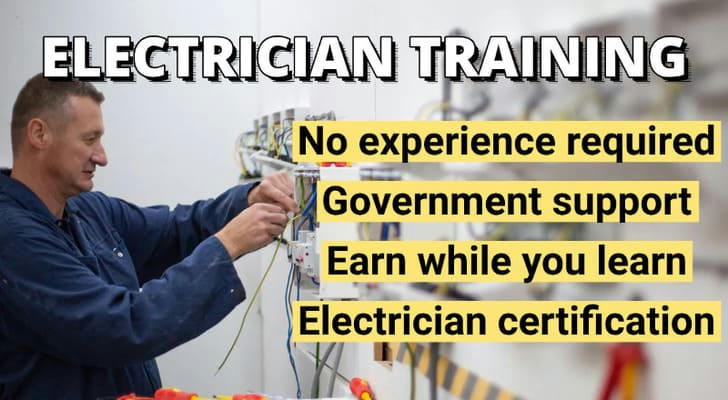No Experience? Get Paid to Train as an Electrician—With Government Support
Looking for a hands-on career with long-term security? Government-supported electrician training programs help you start from scratch, earn a paycheck while learning, and work toward your license—no experience needed. Backed by federal and state funding, these programs offer a fast track into a high-demand trade with great pay, real-world training, and zero college debt.

Why Choose Electrician Training?
Backed by Government Programs
Many electrician tracks are supported through federal or state workforce initiatives, helping cover training essentials like tuition, tools, and materials through structured funding.Earn While You Train
Paid apprenticeships allow you to gain field experience and collect a paycheck as you learn. However, you may need to complete a certain number of years of service, depending on the training institution.No Experience Required
Programs start with core concepts—safety, circuitry, and tools—so beginners can build skills step by step with expert guidance.Strong Job Outlook
With ongoing demand driven by infrastructure and energy needs, electrician roles offer reliable employment and long-term income growth.Diverse Career Options
Specialize in residential, commercial, industrial, or green energy systems to match your interests and goals.
Recommended electrician courses
IEC Apprenticeship Program
The IEC Apprenticeship Program is widely recognized as one of the best electrical training programs in the country.
Paid Training & No Experience Required
Learn from the ground up with hands-on, on-the-job training during the day and classroom/lab sessions at night—all while getting paid.Nationally Recognized Certification
Approved by the U.S. Department of Labor. Graduates receive a nationally recognized journeyman electrician certificate.Nationwide Availability
Over 70 training centers across the United States.College Credit
Completing the 4-year program can earn you up to 57 college credits, supporting your future educational goals.Subsidized Tuition
Tuition is partially covered by employers or government funding—no student loans needed.
WECA Apprenticeship Program
The Western Electrical Contractors Association (WECA) offers some of the most respected apprenticeship programs on the West Coast.
High Graduation Rates & Positive Reviews
Known for cutting-edge curriculum, effective on-the-job training, and an experienced, dedicated team of instructors and administrators.Earn While You Learn
Apprentices earn wages while completing coursework and gaining real-world job experience.No College Debt
Graduate into a rewarding and high-paying technical career—without the burden of student loans.
Example: California Residential Wireman Apprenticeship
- 3-Year Program
- Paid On-the-Job Training
- Additional Benefits Provided by Contractors
May include major medical, 401(k), or cash equivalents.
Electrical Training Alliance (Formerly NJATC)
The Electrical Training Alliance offers one of the most comprehensive and collaborative apprenticeship programs across North America.
Eligibility Requirements
- Must be at least 18 years old
- High school diploma or equivalent
- Basic algebra proficiency
- No prior experience needed
Industry-Recognized Certifications
Through partnerships with local JATCs (Joint Apprenticeship Training Committees) and AJATCs, apprentices can earn certifications across multiple specialties.Blended Learning Approach
Includes online and in-person instruction tailored for entry-level electrical apprentices and continuing education for IBEW and NECA members/employees.Extensive Network
Over 200 local JATC training centers nationwide, in collaboration with more than 100 industry companies and organizations.
JATC Apprenticeship Program
The Joint Apprenticeship and Training Committee (JATC) offers a structured and rewarding pathway into the electrical trade, combining paid, hands-on training with classroom instruction.
Earn While You Learn
First-year apprentices can earn up to $65,020 annually, including benefits. Wages and benefits increase every six months as you advance.Engaging Learning Format
A fast-paced, interactive learning environment that combines hands-on jobsite experience with lab-based classroom training.High Earning Potential
After completing the 5-year apprenticeship, total compensation can reach up to:
• $106,000 annual salary
• $41,000 in health and retirement benefitsTop-Tier Benefits
Comprehensive healthcare coverage available as early as 3 months into the program.Long-Term Job Security
Graduates benefit from ongoing union-sponsored continuing education and gain access to advanced skills and certifications not typically available outside the union.
Application Process
Pick Your Program & Confirm Eligibility
Select the electrician course you want to take and make sure you meet their basic criteria (age, diploma/GED, work permit, income/veteran status).Prepare Required Documents
Gather ID, high-school/GED transcript, Social Security or work-authorization papers and any income or veteran verification.Submit the Application
Complete the online or paper form on the program’s website, indicating your interest in the electrician/apprentice track.Pass Assessment & Interview
Take the basic math/reading test (and physical screen if required), then meet with union, contractor or training-center staff to discuss your fit.Enroll & Start Training
Sign the apprenticeship or enrollment agreement, complete orientation, and begin your mix of classroom instruction and paid on-the-job work.

Real-World Success Stories
“I never picked up a multimeter before turning 25. Through a local IBEW apprenticeship, I went from zero experience to earning $28/hour by Year 2. The government covered my tuition, and my agency provided every tool I needed.” — Marcus, Los Angeles, CA
“After the Army, I used my GI Bill benefits alongside an apprenticeship program. I had no clue about wiring, but today I lead crews on solar farm installations and make six figures.” — David, Phoenix, AZ
Frequently Asked Questions
Do I need any electrical background?
No—programs start with fundamentals and build up skills.
What if I don’t live near a union chapter?
Many community colleges and workforce programs offer similar apprenticeships.
How long does it take to become a journeyman?
Typically 3–5 years (8,000+ hours of work plus classroom instruction).
Will I owe the government anything?
No; you commit service hours to your sponsor rather than repaying loans.
Can women join these programs?
Absolutely—programs are open to all qualified applicants.
